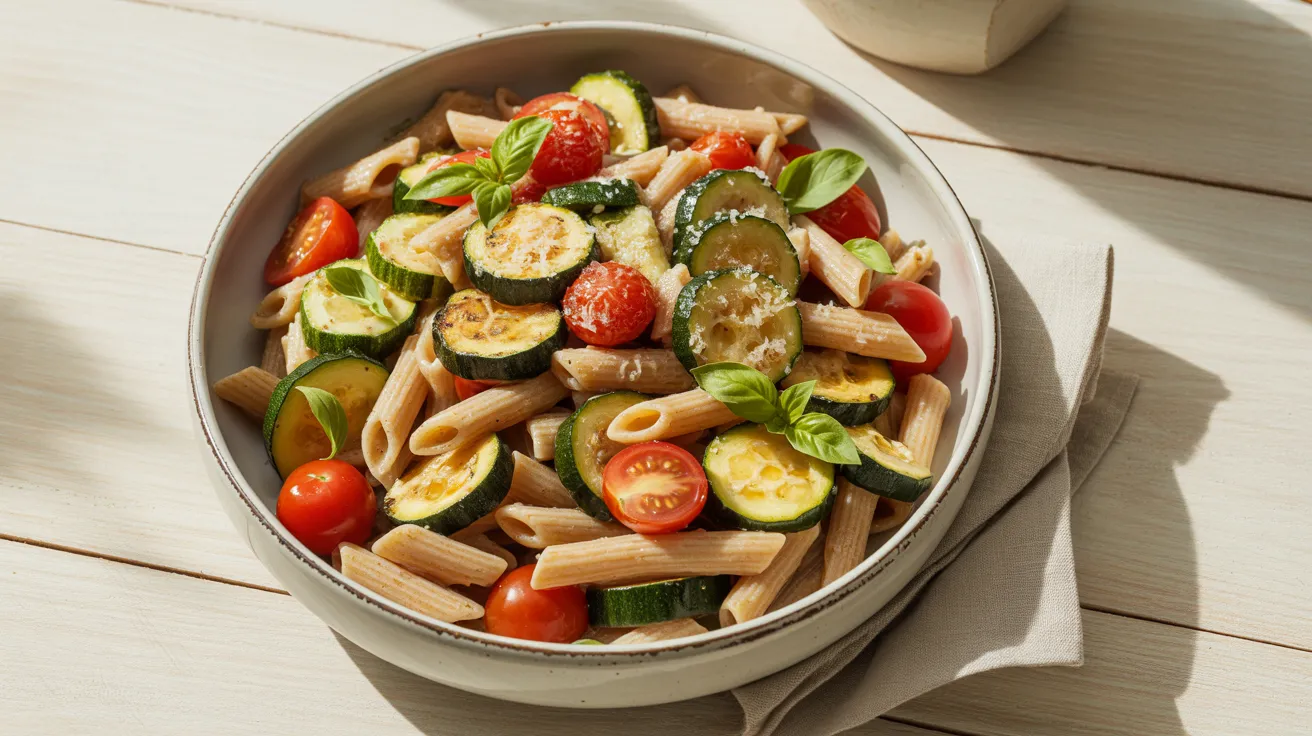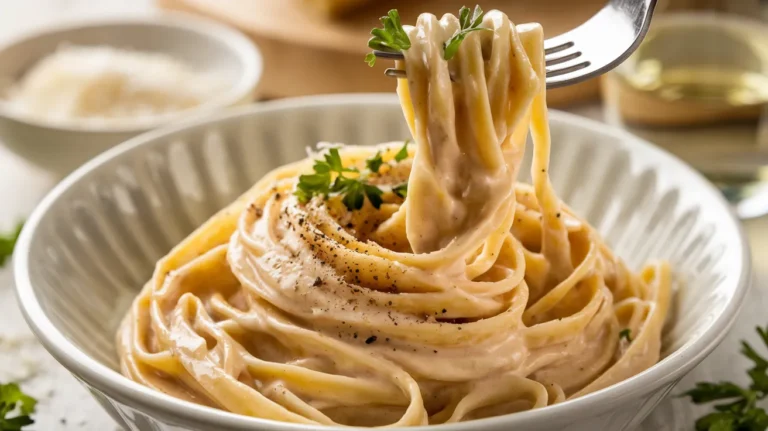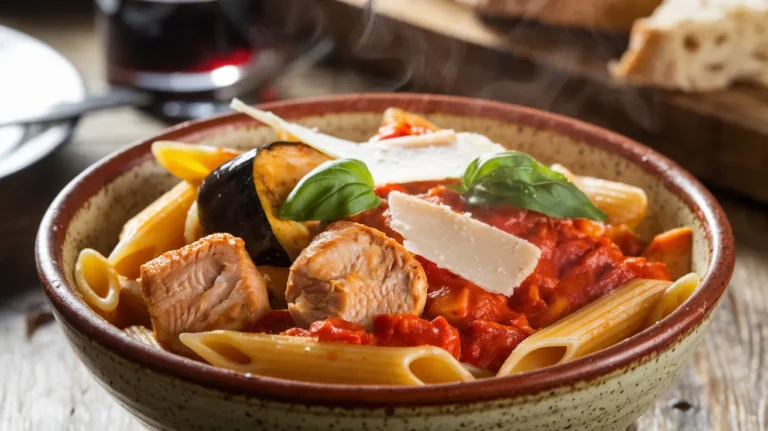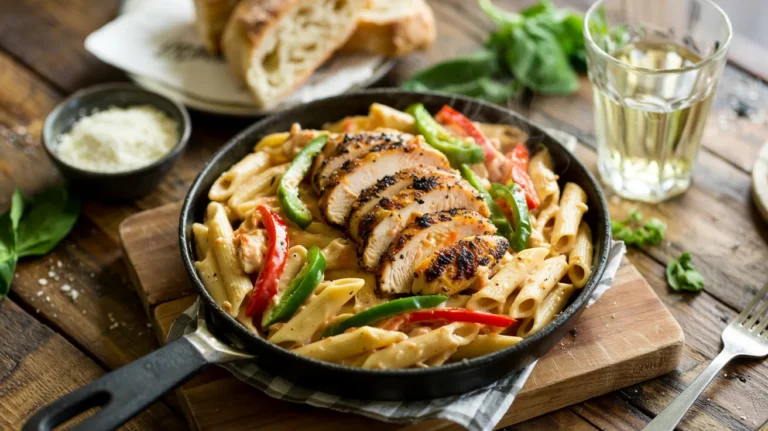Key Takeaways:
- This healthy tomato zucchini pasta combines fresh summer vegetables with whole wheat pasta for a nutritious meal
- Perfect portion size serving 4 people with only 320 calories per serving
- Simple technique using one skillet keeps cleanup minimal and flavors concentrated
- Ready in 25 minutes using basic ingredients you probably already have
Introduction
Looking for a light pasta dish that doesn’t leave you feeling heavy? This healthy tomato zucchini pasta became my go-to recipe when I wanted something satisfying but packed with vegetables.
The secret is cooking the zucchini until golden and letting the cherry tomatoes burst naturally. This creates a fresh sauce without any cream or heavy ingredients.
Nutrition Comparison
| Nutrient | Per Serving | Daily Value % |
|---|---|---|
| Calories | 320 | 16% |
| Protein | 12g | 24% |
| Fiber | 6g | 21% |
| Vitamin C | 35mg | 39% |
| Potassium | 580mg | 12% |
Equipment & Ingredients
Kitchen Tools Needed
| Tool | Purpose |
|---|---|
| Large pot (6-8 quart) | Boiling pasta water |
| Large skillet (12-inch) | Sautéing vegetables |
| Colander | Draining pasta |
| Sharp chef’s knife | Chopping vegetables |
| Large cutting board | Food prep surface |
| Wooden spoon | Stirring pasta |
Full Ingredients List (Serves 4)
| Ingredient | Amount | Notes |
|---|---|---|
| Whole wheat pasta | 12 oz | Penne or rigatoni recommended |
| Medium zucchini | 2 pounds | About 3-4 zucchini |
| Cherry tomatoes | 1 pint | Choose firm, ripe ones |
| Garlic cloves | 4 large | Fresh garlic essential |
| Extra virgin olive oil | 3 tablespoons | Good quality makes a difference |
| Fresh basil leaves | 1/2 cup | Packed measurement |
| Parmesan cheese | 1/2 cup | Freshly grated preferred |
| Red pepper flakes | 1/4 teaspoon | Adjust to taste |
| Kosher salt | 1 teaspoon | For pasta water |
| Black pepper | To taste | Freshly ground |
Optional Substitutions
• Gluten-free option: Use chickpea or brown rice pasta • Dairy-free: Replace Parmesan with nutritional yeast (3 tablespoons) • Protein boost: Add 1 cup cooked white beans or grilled chicken • Different vegetables: Yellow squash or baby eggplant work well
Detailed Step-by-Step Instructions for Beginners
Prep Time: 10 minutes
Cook Time: 15 minutes
Total Time: 25 minutes
Preparation Phase (8 minutes)
Step 1: Start the pasta water Fill your largest pot with water, leaving about 3 inches from the top. Add 1 teaspoon kosher salt – the water should taste slightly salty. Place on your largest burner and turn heat to high. Cover with a lid to speed up boiling.
Beginner tip: Start this first – pasta water takes 10-15 minutes to boil
Step 2: Prepare your workspace Clear a large area on your counter near the stove. Set out your cutting board, sharp knife, and all ingredients. Having everything ready makes cooking much smoother.
Safety note: Keep raw ingredients separate from cooked foods
Step 3: Wash and dry vegetables Rinse zucchini and cherry tomatoes under cold running water. Pat completely dry with paper towels. Wet vegetables will splatter when they hit hot oil.
Why this matters: Excess water creates steam instead of browning
Step 4: Cut zucchini properly Trim both ends of each zucchini. Cut each zucchini in half lengthwise first. Place cut-side down on the cutting board for stability. Slice into 1/4-inch thick half-moon pieces. Keep all pieces the same thickness so they cook evenly.
Beginner warning: Uneven pieces mean some will be mushy while others stay raw
Step 5: Prepare cherry tomatoes Remove any stems from tomatoes. Cut each tomato in half from top to bottom (not around the middle). This exposes more surface area for caramelization.
Pro tip: Save the juiciest tomatoes for last – they’ll add extra flavor
Step 6: Mince garlic correctly Peel garlic cloves by crushing them lightly with the flat side of your knife. The papery skin will slip right off. Chop garlic into tiny, uniform pieces. The smaller you chop, the more flavor you’ll get.
Important: Minced garlic burns quickly, so have it ready but don’t add too early
Assembly and Cooking Phase (15 minutes)
Step 7: Start cooking pasta Once water reaches a rolling boil (big bubbles breaking the surface), add pasta. Stir immediately with a wooden spoon to prevent sticking. Set a timer for 2 minutes less than package directions suggest – we want it slightly underdone since it will finish cooking with the vegetables.
Timing tip: Start your vegetables when pasta has 8 minutes left
Step 8: Heat your skillet properly Place your large skillet over medium-high heat. Wait 2 minutes, then add 2 tablespoons olive oil. The oil should shimmer but not smoke. If it smokes, lower the heat immediately.
Temperature test: Drop a small piece of zucchini in – it should sizzle gently
Step 9: Cook zucchini in batches Add half the zucchini pieces to the hot oil in a single layer. Don’t overcrowd – pieces should not touch each other. Let cook undisturbed for 3-4 minutes until golden brown on the bottom.
Beginner mistake: Moving vegetables too early prevents proper browning
Step 10: Flip zucchini carefully Using a spatula, flip each piece of zucchini. Cook for 2 more minutes until the second side is golden. Transfer cooked zucchini to a plate. Repeat with remaining zucchini if needed.
Why we do this: Proper browning creates deep, sweet flavors
Step 11: Add garlic at the right moment Push all cooked zucchini to one side of the skillet. Add minced garlic to the empty space. Cook for just 30 seconds, stirring constantly. The garlic should smell fragrant but not turn brown.
Critical timing: Burnt garlic tastes bitter and ruins the whole dish
Step 12: Add tomatoes strategically Add halved cherry tomatoes cut-side down to the skillet. Season with 1/2 teaspoon salt and a few grinds of black pepper. Let cook for 2-3 minutes without stirring. You’ll hear them sizzling.
What to look for: Tomatoes will start releasing their juices and softening
Step 13: Create the sauce base Gently stir tomatoes with zucchini and garlic. Some tomatoes will break down naturally – this creates your sauce. Cook for 2 more minutes until tomatoes are soft but still hold their shape.
Flavor building: The natural tomato juices mix with olive oil to create a light sauce
Final Assembly Phase (5 minutes)
Step 14: Reserve pasta water Before draining pasta, use a ladle or measuring cup to scoop out 1 cup of the starchy cooking water. Set aside in a bowl. This liquid gold will help bind everything together.
Why this works: Starchy pasta water acts as a natural thickener
Step 15: Drain pasta properly Pour pasta into colander in the sink. Give it a few shakes but don’t rinse – you want that starch coating. Immediately transfer hot pasta to the skillet with vegetables.
Timing is key: Work quickly while pasta is still steaming hot
Step 16: Combine everything expertly Using tongs or a large spoon, toss pasta gently with vegetables over low heat. Add pasta water gradually, starting with 1/4 cup. The mixture should look silky, not dry or soupy.
Perfect consistency: Pasta should be lightly coated, not swimming in liquid
Step 17: Add fresh elements Remove skillet from heat completely. Tear basil leaves by hand into smaller pieces (cutting bruises them). Add torn basil and remaining 1 tablespoon olive oil. Toss gently.
Why we finish off heat: Preserves the bright green color and fresh basil flavor
Step 18: Final seasoning Add half the Parmesan cheese and toss. Taste a piece of pasta with vegetables. Add more salt, pepper, or red pepper flakes as needed. Remember, you can always add more but can’t take it away.
Beginner tip: Season gradually and taste frequently
Step 19: Serve immediately Divide healthy tomato zucchini pasta among 4 bowls. Top each serving with remaining Parmesan cheese and a few extra basil leaves for color.
Best practice: Warm bowls in a 200°F oven for 2 minutes before serving
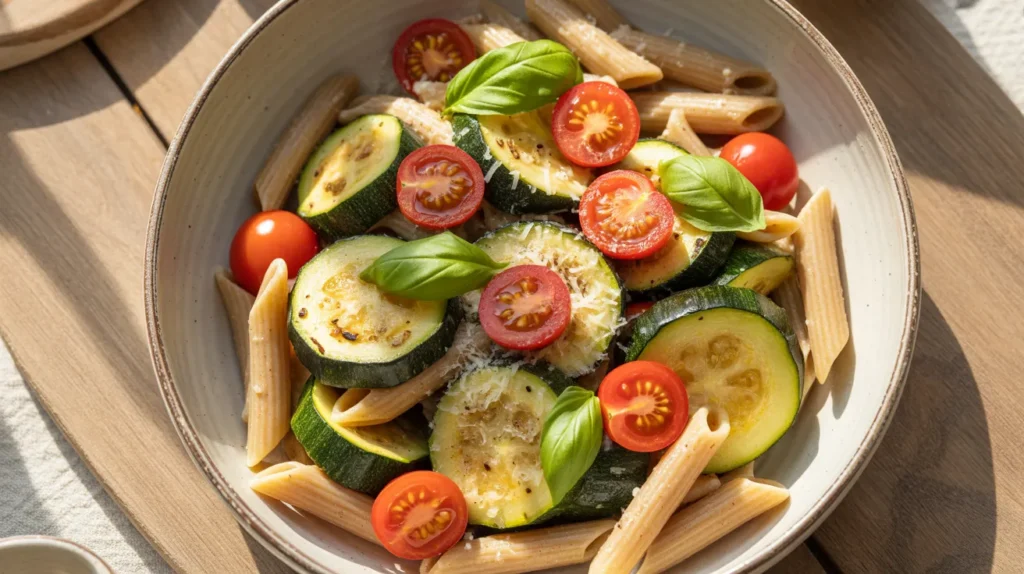
Troubleshooting Common Beginner Issues
Problem: Zucchini turns to mush Solution: Cook over higher heat and don’t stir too frequently. Mushy vegetables happen when moisture can’t escape properly.
Problem: Pasta seems dry and sticky Solution: Add more reserved pasta water, one tablespoon at a time. The starch helps create a silky coating that brings everything together.
Problem: Flavors taste flat or bland Solution: Season each component as you cook, not just at the end. Salt the zucchini while cooking, season tomatoes separately.
Problem: Garlic tastes bitter Solution: Lower heat immediately if garlic starts browning. Burnt garlic ruins the whole dish – start over if this happens.
Problem: Sauce won’t come together Solution: Make sure pasta is hot when combining. Cold pasta won’t absorb flavors properly.
Healthy Tomato Zucchini Pasta Variations
Mediterranean Style
Add 1/3 cup Kalamata olives, 2 tablespoons sun-dried tomatoes, and crumbled feta cheese. This combination pairs beautifully with the fresh vegetable base.
Protein-Packed Version
Toss in 1 cup cooked cannellini beans or grilled chicken strips during step 16. For those who enjoy heartier pasta dishes, this hatch chile chicken pasta offers a spicy alternative.
Herb Garden Special
Replace basil with equal amounts of fresh oregano, thyme, and parsley. Each herb brings its own personality to this healthy tomato zucchini pasta.
Creamy Light Version
Stir in 3 tablespoons Greek yogurt or cream cheese during final mixing for richness without heavy cream.
Storage & Reheating Your Healthy Tomato Zucchini Pasta
Refrigerator storage: Store leftovers in sealed containers for up to 3 days. The flavors actually improve overnight as they meld together.
Best reheating method: Add 2 tablespoons water or broth to a skillet. Heat leftover pasta over medium-low temperature, stirring gently until warmed through. Avoid microwave if possible – it makes pasta gummy.
Freezing considerations: This dish doesn’t freeze well due to the high water content in zucchini. The vegetables become watery when thawed.
Make-ahead strategy: Prep all vegetables the night before. Store cut zucchini and tomatoes in separate containers to prevent excess moisture buildup.
Safety Notes & Professional Tips
Food Safety Essentials
• Wash all vegetables thoroughly under running water before cutting • Don’t leave cooked pasta at room temperature longer than 2 hours • Store leftovers promptly in refrigerator below 40°F • Use separate cutting boards for vegetables and any meat additions
Cooking Success Secrets
• Salt pasta water generously – it should taste like mild seawater for proper seasoning • Never rinse cooked pasta – the surface starch helps sauce adhere properly
• Always save pasta water – you can’t recreate that starchy, seasoned liquid later • Invest in quality pasta – Italian bronze die cut pasta has rough surfaces that grab sauce better
Critical Beginner Warnings
• Zucchini naturally releases water as it cooks – this creates the sauce base • Taste and adjust seasoning throughout cooking, not just at the end
• Fresh basil leaves bruise easily – add them last and handle gently • Hot oil spatters when wet vegetables are added – pat everything dry first
Why This Healthy Tomato Zucchini Pasta Works
This healthy tomato zucchini pasta recipe succeeds because it treats vegetables as the star, not an afterthought. The combination of caramelized zucchini, burst cherry tomatoes, and fresh basil creates layers of flavor that satisfy without heaviness.
Perfect for summer when zucchini and tomatoes are at their peak, but grocery store versions work beautifully year-round. The technique of browning vegetables properly makes even simple ingredients taste restaurant-quality.
Your family will love how fresh and vibrant this healthy tomato zucchini pasta tastes compared to heavy cream-based alternatives. Plus, at only 320 calories per generous serving, you can enjoy seconds without guilt.
